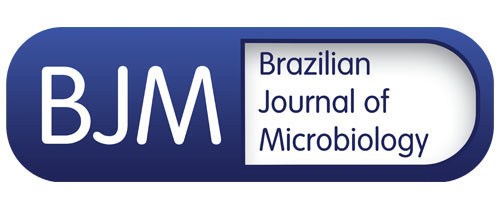BJM
Impact factor 2019: 2.428
The Brazilian Journal of Microbiology (BJM) is the official publication of the Sociedade Brasileira de Microbiologia (Brazilian Society for Microbiology). It publishes original research papers and reviews, covering all aspects of Microbiology. The journal has a strict policy of manuscript evaluation, and each manuscript is evaluated carefully by at least two selected referees.
The abbreviated title of the journal is Braz. J. Microbiol., which should be used in bibliographies, footnotes, bibliographical references and strips.
All articles will be published under the CC-BY-NC-ND (Creative Commons Attribution-NonCommercial-NoDerivatives 4.0 International) license. Open Access funded by Sociedade Brasileira de Microbiologia.
Indexing: NCBI (PubMed - USA), Current Contents (ISI – USA), Web of Science (ISI – USA), Chemical Abstracts (CAS – USA), Biological Abstracts (BIOSIS – USA), Food Science and, Technology Abstracts (FSTA – USA), Commonwealth Agricultural Bureaux (CAB – UK), Ulrich’s International Periodicals (USA), LILACS (La Literatura Latinoamericana y del Caribe de Información en Ciencias de la Salud BIREME/PAHO/WHO), SCOPUS (Amsterdam, The Netherlands), Directory of Open Access Journal (DOAJ) (Lund, Sweden), OpenJ-Gate (India), Genamics Journal Seek (Hamilton, New Zealand), and Scientific Electronic Library Online – SciELO.
Articles Published from 1959 to 1999
Editorial Board
Editorial board
Editors-in-Chief
Luís Augusto Nero, PhD, Federal University of Viçosa, Brazil
Luiz Henrique Rosa, PhD, Federal University of Minas Gerais, Brazil
Associate Editors: Agriculture and Soil Microbiology
Admir José Giachini, PhD, Federal University of Santa Catarina, Brazil
Aleksander Westphal Muniz, PhD, Brazilian Agricultural Research Corporation, Brazil
Ederson da Conceição Jesus, PhD, Brazilian Agricultural Research Corporation, Brazil
Enderson Petrônio de Brito Ferreira, PhD, Brazilian Agricultural Research Corporation, Brazil
Jerri Édson Zilli, PhD, Brazilian Agricultural Research Corporation, Brazil
Associate Editors: Biotechnology and Industry
Eleni Gomes, PhD, São Paulo State University, Brazil
Gisele Monteiro, PhD, University of São Paulo, Brazil
Júlio César dos Santos, PhD, University of São Paulo, Brazil
Luis Henrique Souza Guimarães, PhD, University of São Paulo, Brazil
Sérgio Luiz Alves Júnior, PhD, Federal University of the Southern Border, Brazil
Rita de Cássia Mendonça de Miranda, PhD, Universidade Ceuma, Brazil
Rosane Freitas Schwan, PhD, Federal University of Lavras, Brazil
Associate Editors: Environment and Biodiversity
Ernani Pinto Junior, PhD, University of São Paulo, Brazil
Jônatas Santos Abrahão, PhD, Federal University of Minas Gerais, Brazil
Luc Felicianus Rouws, PhD, Brazilian Agricultural Research Corporation, Brazil
Lucy Seldin, PhD, Federal University of Rio de Janeiro, Brazil
Marcelle Figueira Marques da Silva Sales, PhD, Federal University of Goiás, Brazil
Melissa Fontes Landell, PhD, Federal University of Alagoas, Brazil
Associate Editors: Food Safety and Quality
Alexander Ogilvie Gill, PhD, Health Canada, Canada
Kalliopi Rantsiou, PhD, University of Turin, Italy
Luciano dos Santos Bersot, PhD, Federal University of Parana, Brazil
Mariza Landgraf, PhD, University of São Paulo, Brazil
Uelinton Manoel Pinto, PhD, University of São Paulo, Brazil
Associate Editors: Medicine and Human Health
Afonso Luís Barth, PhD, Federal University of Rio Grande do Sul, Brazil
Alexandre Melo Bailão, PhD, Federal University of Goiás, Brazil
Beatriz Ernestina Cabilio Guth, PhD, Federal University of São Paulo, Brazil
Carla Torres Braconi dos Santos, PhD, Federal University of São Paulo, Brazil
Celia Maria de Almeida Soares, PhD, Federal University of Goiás, Brazil
Eliane Namie Miyaji, PhD, Butantan Institute, Brazil
Fernando Rogério Pavan, PhD, São Paulo State University, Brazil
Guilherme Sgobbi Zagui, PhD, University of Ribeirão Preto, Brazil
Ilana Lopes Baratella da Cunha Camargo, PhD, University of São Paulo, Brazil
Juliana Pfrimer Falcão, PhD, University of São Paulo, Brazil
Juliana Terzi Maricato, PhD, Federal University of São Paulo, Brazil
Leonardo Neves de Andrade, PhD, University of São Paulo, Brazil
Leticia Miranda Lery Santos, PhD, Oswaldo Cruz Foundation, Brazil
Maurício Lacerda Nogueira, PhD, Faculty of Medicine of São José do Rio Preto, Brazil
Nilton Erbet Lincopan Huenuman, PhD, University of São Paulo, Brazil
Rosana Puccia, PhD, Federal University of São Paulo, Brazil
Roxane Maria Fontes Piazza, PhD, Instituto Butantan, Brazil
Waldir Pereira Elias Junior, PhD, Instituto Butantan, Brazil
Associate Editors: Veterinary and Animal Production
Andréa Regina de Souza Baptista, PhD, Fluminense Federal University, Brazil
Benito Guimarães de Brito, PhD, State University of Londrina, Brazil
Celso Bruno Oliveira, PhD, Federal University of Paraíba, Brazil
David Germano Gonçalves Schwarz, PhD, State University of Santa Catarina, Brazil
Fernando Rosado Spilki, PhD, Feevale University, Brazil
Franciele Maboni, PhD, Federal University of Rio Grande do Sul, Brazil
Luis M. Jara, PhD, Cayetano Heredia University, Peru
Maria Aparecida Scatamburlo Moreira, PhD, Federal University of Viçosa, Brazil
Mateus Matiuzi Costa, PhD, Federal University of Vale do São Francisco, Brazil
Sérgio Santos de Azevedo, PhD, Federal University of Campina Grande, Brazil






